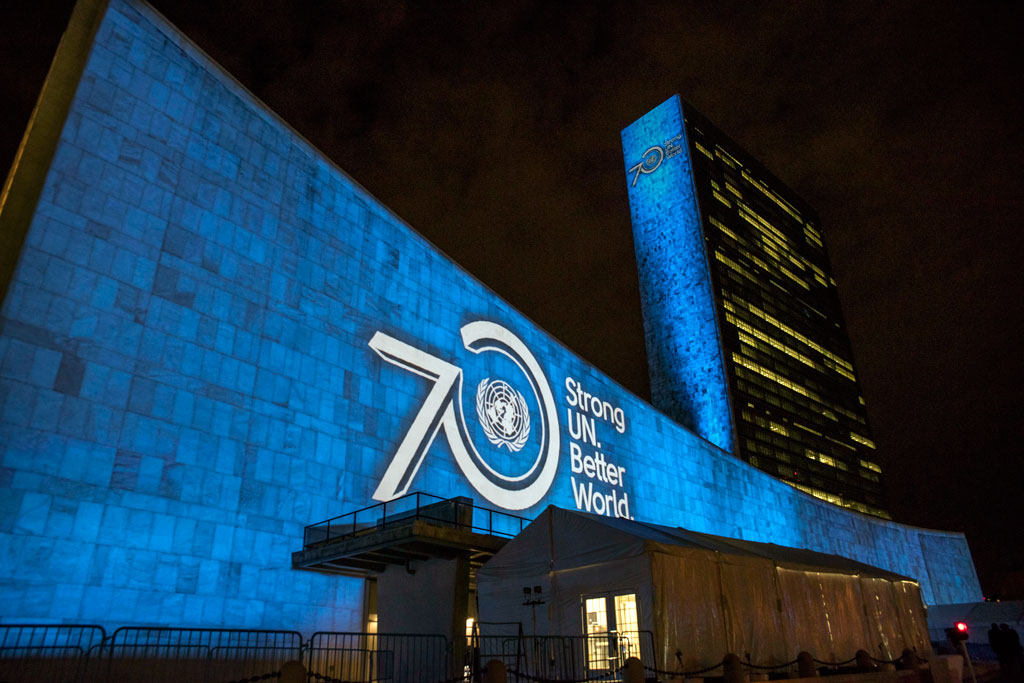A World of Blue: The United Nations and the Ocean
Peter Neill, director of the World Ocean Observatory, has been invited to moderate the two-day inter-parliamentary hearing at the United Nations February 13 and 14 in New York City. Entitled "A WORLD OF BLUE: Preserving the Ocean, Safeguarding the Planet, and Ensuring Human Well-Being In the Context of the UN Sustainability Goals for 2030," the hearing brings together nearly 300 members of parliament from around the world for a discussion about ocean issues. Outcomes from A WORLD OF BLUE will provide contributions to the UN Oceans Conference in June.

The ocean covers about 70% of the earth’s surface, the land mass divided into multiple social units that contain burgeoning population, extraction and use of myriad natural resources, and serve as an ever-shifting arrangement of community, cooperation and conflict. There are 196 nations on earth today; the United States recognizes 195 and the United Nations counts 193 as its members. Of the total, 47 nations are land-locked, have no access to the ocean. The other 149 have watersheds and rivers that reach the sea, coastal communities and port cities that typically host larger populations engaged in enterprise and trade.
Thus the ocean has an enormous implication for a vast percentage of earth’s inhabitants and exists by virtue of global connection as an equally vast commons that cannot be individually exploited or easily governed by any single nation state. The history of war at sea in the name of economic development and the extension of influence and power is a continuing reminder of this challenge.
The United Nations serves as a forum for communication and resolution of issues that confront all nations in the form of treaty agreements, regulatory standards, social and political goals and objectives designed to maintain parity and justice and to promote equity and peace. Representatives from all nations gather to discuss and negotiate, to agree and disagree, and oftentimes come to conclusions and arrangement that contribute to the maintenance of international order for the benefit of all mankind. It would seem that oceans would be an essential part of that focus.
That assumption has taken some time to realize. In early drafts of assessment reports from the UN Intergovernmental Panel on Climate Change, the ocean was hardly addressed at all. Language was drafted but not included or modified at the last minute to the consternation of many who had worked so assiduously to draft content and language that merited inclusion. But things have changed for the better and many UN agencies have expanded their ocean agenda to include new ocean issues in comprehensive reports and plans such as the Sustainable Development and Consumption Goals, a First World Ocean Assessment, Tourism and Biodiversity, Marine Plastic Debris, International Seabed Authority, Food Security and Aquaculture, International Maritime Safety, Climate Change, and the Law of the Sea. All of these subjects will be addressed in a forthcoming meeting of the International Parliamentarian Union, “A WORLD OF BLUE: Preserving the Ocean, Safeguarding the Planet, and Ensuring Human Well-Being In the Context of the UN Sustainability Goals for 2030,” wherein some 300 legislators from countries with ocean issues who will meet at the General Assembly in New York for two days of panel presentations and workshops, moderated by the World Ocean Observatory, to familiarize these representatives with ocean issues and to organize observations and suggestions to be presented as a final report to the General Assembly at The Ocean Conference at the UN Headquarters in June.
The purpose of this larger meeting is to be “the game changer” that will reverse the decline in the health of our ocean for people, planet and prosperity. It will be solutions-focused with engagement from all as a means to support the implementation of Goal 14 of the UN 2030 Agenda “to conserve and sustainably use the oceans, seas and marine resources for sustainable development.” The WORLD OF BLUE Conference shall:
- Build on existing successful partnerships and stimulate innovative and concrete new partnerships to advance the implementation of Goal 14.
- Involve all relevant stakeholders, bringing together Governments, the United Nations system, other intergovernmental organizations, international financial institutions, non-governmental organizations, civil society organizations, academic institutions the scientific community, the private sector, philanthropic organizations and other actors to assess challenges and opportunities relating to, as well as actions taken towards, the implementation of Goal 14.
- Share the experiences gained at the national, regional and international levels in the implementation of Goal 14.
The event will culminate with the World Oceans Day celebration on June 8th when organizations and civic groups gather worldwide to focus on the sustainable ocean through educational events, festivals, beach clean-ups, and other activities to build public awareness and engagement with the urgent need to understand and preserve the ocean for the benefit of all mankind. This schedule and language may appear complicated and careful, and indeed it is, but this is the pace of deliberation and consensus that lies at the core of the United Nations process of balancing and reconciling the myriad interests of the 193 members whose ultimate consensus will enable change and success for the sustainable ocean.
- Login to post comments
-


